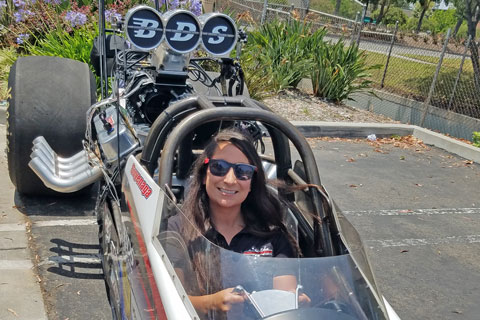PEOPLE
Remembering Dave McClelland
The voice of countless drag races and SEMA events left a rich legacy of memories and set a high bar for those who follow him behind the microphone
By Drew Hardin
Photography Courtesy NHRA and Petersen Publishing Company Archives
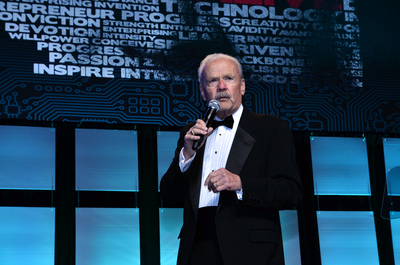
Dave McClelland “cared about the people in our industry, and he brought that care to all the work he did with SEMA—whether it was as a volunteer serving on various committees or standing in front of an audience for the countless award banquets he anchored as master of ceremonies,” said outgoing SEMA President and CEO Chris Kersting.
That voice. The honeyed baritone was so distinctive, immediately recognizable whether he was addressing thousands at an NHRA drag race, hundreds at a SEMA Banquet or in one-on-one conversation. And it wasn’t just the tenor of his voice; even when he was behind the microphone, Dave McClelland sounded like he was talking to just you, car guy to car guy (or gal), fully engaged in the passion he shared with fans and friends.
Sadly, we won’t have those conversations anymore. McClelland passed away of natural causes in May at the age of 85. We are fortunate, though, that so much of his work can still be enjoyed through archival videos available online. We can relive the excitement of a final-round upset or the drama of an engine explosion, all while McClelland narrates the action with a mix of expertise and authority—and concern for a racer’s safety when the unexpected happens.
There’s no question McClelland brought a tremendous amount of talent to his role as an announcer. Training, too. He was interested in music and drama as far back as high school and took what he called an “experimental” course in radio and television broadcasting while in college in central Missouri in the mid-’50s.
But McClelland had qualities that set him apart from those with just talent and training. It’s what former SEMA President and CEO Chris Kersting called his “secret sauce.”
McClelland, said Kersting, “collected a lifetime of knowledge and relationships in the performance and racing industry, and that was the foundation for his outstanding work, whether it was in media, in his career announcing racing events, or performing as master of ceremonies. He cared about people in our industry, and he really brought that care to all the work he did. What was special about Dave was that he was one of those people whose personal traits and talents came together with a career role that allowed him to really deliver in an exceptional way.”
“He would look you in the eye, he would speak to you with respect, and he was just an overwhelmingly positive influence,” said Brian Lohnes, who now fills McClelland’s role as lead announcer for the NHRA. “Whether you’re talking about interacting with a single person at the race track or with a million people on TV, Dave’s genuine nature came through. He made everyone feel important and respected.”
McClelland was affable and humble. He may have broadcast from the tower, but he was just as comfortable walking through the pits talking to racers and listening to stories from fans. His approachability was rooted in the fact that he was a true enthusiast and a drag racer himself.
Blown Away
As he told the story in various interviews over the years, McClelland’s first exposure to drag racing was in 1955, when he went to a race in his Kansas City, Missouri, hometown while a senior in high school. He remembered being “blown away” by what he saw. Not only could fans get close to the drivers and the cars in the pits, but unlike the Circle Track racing that was popular in the area, drag racing was something he could see himself doing.
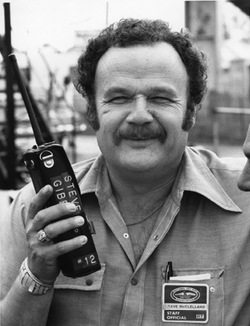
McClelland held several positions during his tenure at the NHRA, from track manager to director of communications.
He did just that. He started racing while he finished college and began his career in television and radio, and he would continue to race for years. One of his cars, the “Tuna Tank” Fiat Altered, has been restored and is on display at the Wally Parks NHRA Motorsports Museum.
McClelland was first able to mix his racing and broadcasting passions in 1959 at a small airstrip-turned-race-track in Carlisle, Arkansas. As he recalled in an interview with Hot Rod magazine, he was there with friends who were racing a modified sports car, and he found himself in the staging lanes when Eddie Hill and Art Malone (filling in for Don Garlits) lined up for a series of match races. The track announcer became suddenly mute.
“The guy either froze or fainted or whatever,” McClelland said. “Here’s the best-known drag racer in the world right in front of you on your race track, and you’re holding the mic not saying anything. How can you do this? The manager was getting more and more concerned by the moment, and I turned to him and said, ‘Do you mind if I give it a try?’ He said, ‘You couldn’t do any worse.’”
For many years McClelland juggled race announcing with his day job on the radio, even after he signed on with the NHRA in 1961 to work at the U.S. Nationals in Indianapolis.
“They were going to compensate me $25 and a hotel room,” he told Hot Rod. “That was five days of work with three announcers, for $25. Yes, the math is correct, that’s $5 a day. I thought I had died and gone to heaven.”
High Demand
For the next 10 years, McClelland worked at NHRA races on a part-time basis and took other announcing gigs as he was able. In the early ’70s he spent a short time managing the Dallas International Speedway for NHRA; but when that track left the sanctioning body, he joined NHRA’s promotions and PR department. By 1973, he took the job he would hold for decades as the television host of the NHRA’s drag racing series and its on-site event announcer.
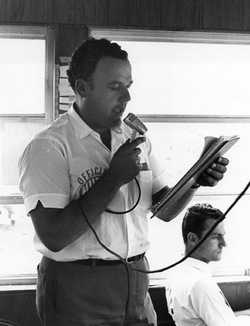
McClelland began announcing drag races in 1959 and signed on with the NHRA in 1961 at the U.S. Nationals in Indianapolis.
Even then, McClelland mixed his NHRA announcing duties with other work. He joined the staff of Popular Hot Rodding magazine as an ad salesman in the late ’70s and while there, came up with the concept of the Super Chevy Sunday shows. He did voice-over work for television and radio commercials. He began hosting the SEMA Awards Banquet in 1976 and would soon be in high demand as a master of ceremonies for a number of corporate clients, most of which, like SEMA, were automotive- and/or performance-related.
“Dave would take the time to meet around a conference room table on several occasions in advance to plan each and every SEMA Awards Banquet each year,” Kersting said. “It was during these sessions that you could really see Dave’s incredible industry experience and his interest in the people we would be honoring, and the level of care to get it right. We all learned so much over the years from him during those sessions. Dave’s standards and approach for delivering great events is going to live on at SEMA as a legacy.
“It was special, and I think everybody realized it was special, too,” Kersting added. “We all, across the course of our lives, are exposed to people who perform in a role that Dave was performing, and rarely do you run into somebody who could do it like Dave could do it.”
McClelland retired from the NHRA in 2003, having spent, by his count, some 27 years doing play-by-play on television and 40-some years as a track announcer. His love of the sport never flagged; it was the stress of the travel that finally took him off the road.
“I think that somebody who doesn’t travel for a living and have to work on the road doesn’t understand how hard it can be on you,” he told Hot Rod. When his broadcasting partner and good friend Steve Evans died of a heart attack in a Las Vegas hotel room in the late ’80s, “that solidified my thinking that I ain’t gonna drop dead on the road. Of course, I just damn near dropped dead on the road two years later, in 1991, when I needed a triple bypass. I never got discouraged about the racing. I got to the point I couldn’t take the travel anymore.”
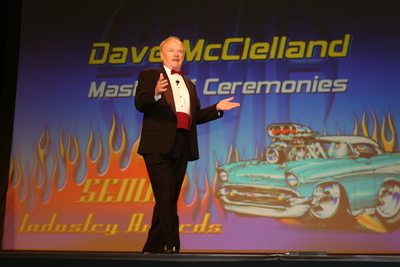
“Dave’s standards and approach for delivering great events is going to live on at SEMA as a legacy,” said Kersting.
Among the accolades and awards McClelland earned over the course of his career was induction into the SEMA Hall of Fame in 1994. His Hall of Fame bio noted that “Dave has been such a presence in the performance industry that he ranks as one of the few ‘behind-the-mic’ talents whose face is as recognizable as his voice.” He was also inducted into the Motorsports Hall of Fame of America, earned a spot on the Car Craft magazine All-Star Drag Racing Team as well as a Car Craft Ollie Award, was given a Founder’s Award by the International Drag Racing Hall of Fame, and received a Pioneer Award by the American Auto Racing Writers and Broadcasters Association.
“His Heart and Soul Were in the Sport”
Lohnes started working with McClelland after his retirement, when he was doing the corporate emcee work and announcing at nostalgia drag races and other, smaller events.
“I think his most endearing quality, when you watched a race where he was announcing, you could tell he was engaged in the race, in what was happening, and in the people who were racing. He was not a guy who started in another motorsport and ended up in drag racing. His heart and soul were in the sport. He was a home-grown product of the sport, and that set him apart. If you look at the way he spoke about the drivers and their accomplishments, he gave them the gravitas they deserved.”
Lohnes said McClelland didn’t have a favorite event, per se, “but at the U.S. Nationals he always sounded a little different, in a good way. And when Don Garlits was in the final round, there was always a little more gas in the tank for Dave. I’m not saying he had a favorite, or he was pulling for Garlits to win, but there was something about Don Garlits and the magic of that era and what he did that definitely brought the best out in Dave.”
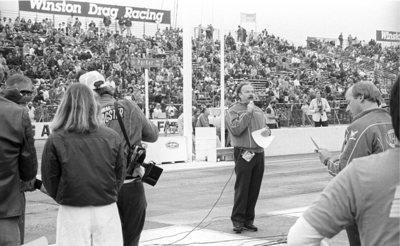
McClelland spent more than 40 years as an on-track announcer for the NHRA. A drag racer himself, he brought expertise and authority to his racing calls.
For Lohnes, McClelland’s most memorable race call was in 1986, when Garlits faced Darrell Gwynn in the Top Fuel final of the NHRA Chief Nationals in Dallas. Gwynn was heavily favored, having set the brand-new track’s ET and speed records (and was the first-ever Top Fueler to run under 5.20 sec. and more than 275 mph).
This race was “probably the single most excited, screamy moment that Dave has ever had,” Lohnes said. “He was never a screamer. Dave had that big baritone voice, but he used it very smartly. But in this particular race, he just loses his mind, and it’s fantastic.”
Garlits, too, has vivid memories of that race in Dallas. “I went right to the line and staged, never allowing any time for heat. I never ran a very high percentage of nitro and didn’t need a lot of heat like everyone else. Gwynn’s car stumbled, and that’s all it took. Dave must have had a bet on me with the NHRA ‘kids’ in the tower, thinking that I wasn’t going to let the ‘Kid’ beat me. When I won, all hell must have broken loose in the tower, and Dave went nuts over the PA. I never really found out how much was bet, but it probably was a good bit!
“I loved Dave, he was a real fan, followed my career for many years,” Garlits added. “I worked with Dave for many years doing TV. He was one of the nicest people to work with that I have ever met.”
“Dave was the antithesis of that saying, ‘You should never meet your heroes,’” Lohnes said. “If they’re like Dave McClelland, you should always meet your heroes.”

